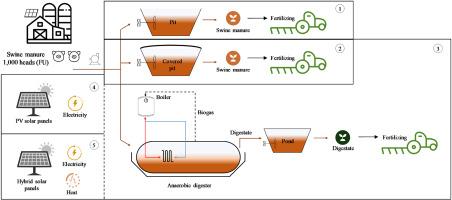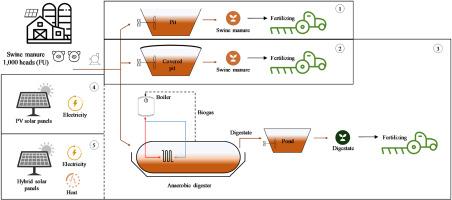猪粪管理的生命周期评估:不同管理系统的蒙特卡罗模拟比较
IF 10
1区 环境科学与生态学
Q1 ENGINEERING, ENVIRONMENTAL
引用次数: 0
摘要
由于甲烷(一种重要的温室气体)和氨的排放导致酸化和富营养化,农业产业对环境产生了深刻的影响。认识到解决环境影响的紧迫性,本研究分析了不同的粪便管理策略以及不同的能源来源。使用的主要分析工具是生命周期评估(LCA),重点是评估环境影响,并在此背景下确定最可持续的方法。此外,蒙特卡罗分析(MCA)应用于探讨排放量如何随粪便组成的变化而波动。这项研究有助于将农业实践与可持续发展目标结合起来,减少对环境的影响。基于沼气和太阳能的猪粪管理提出了五种方案,当厌氧消化阶段被纳入该过程时,对气候变化类别产生了实质性的积极影响。相反,在农业中引入可再生技术后,与氨排放相关的影响并没有显著减少。MCA揭示了在研究的最简单的情况下,在没有沼气生产的情况下,对气候变化和酸化的影响高度依赖于粪便的化学成分。太阳能系统的应用改善了能量平衡,从而减少了对整体环境的影响。从这个意义上说,同时产生热能和电能的混合面板具有最高的能量回收率,但由于这些系统的材料复杂性更高,对富营养化,毒性和资源利用的影响明显更高。本文章由计算机程序翻译,如有差异,请以英文原文为准。


Life cycle assessment of swine manure management: A comparison of different management systems with Montecarlo simulation
The agricultural industry deeply impacts in the environment due to methane, an important greenhouse gas (GHG), and ammonia emissions that causes acidification and eutrophication. Recognising the urgency of addressing the environmental impact, this study analyses different manure management strategies coupled with diverse energy sources. The principal analytical tool employed was Life Cycle Assessment (LCA), with a focus on evaluating environmental impacts and discerning the most sustainable approach within this context. In addition, Monte Carlo Analysis (MCA) was applied to explore how emissions may fluctuate in response to variations of manure composition. This research contributes to ongoing efforts to align agricultural practices with sustainability goals and reduce the environmental impact. Five scenarios proposed on the swine manure management, based on biogas and solar energy, demonstrate a substantial positive impact on the climate change category when an anaerobic digestion stage is incorporated into the process. Conversely, the impacts related with ammonia emissions were not significantly reduced with the introduction of renewable technologies in the farming. The MCA revealed a high dependence on the chemical composition of the manure for the impacts climate change and acidification in case of the simplest scenarios studied, without biogas production. The application of a solar energy system improves the energy balance and consequently reduce the overall environmental impact. In this sense, hybrid panels that simultaneously generate thermal and electric energy presented the highest energy recovery but significantly higher impacts on eutrophication, toxicity and resource use, due to the higher complexity of materials of these systems.
求助全文
通过发布文献求助,成功后即可免费获取论文全文。
去求助
来源期刊

Journal of Cleaner Production
环境科学-工程:环境
CiteScore
20.40
自引率
9.00%
发文量
4720
审稿时长
111 days
期刊介绍:
The Journal of Cleaner Production is an international, transdisciplinary journal that addresses and discusses theoretical and practical Cleaner Production, Environmental, and Sustainability issues. It aims to help societies become more sustainable by focusing on the concept of 'Cleaner Production', which aims at preventing waste production and increasing efficiencies in energy, water, resources, and human capital use. The journal serves as a platform for corporations, governments, education institutions, regions, and societies to engage in discussions and research related to Cleaner Production, environmental, and sustainability practices.
 求助内容:
求助内容: 应助结果提醒方式:
应助结果提醒方式:


